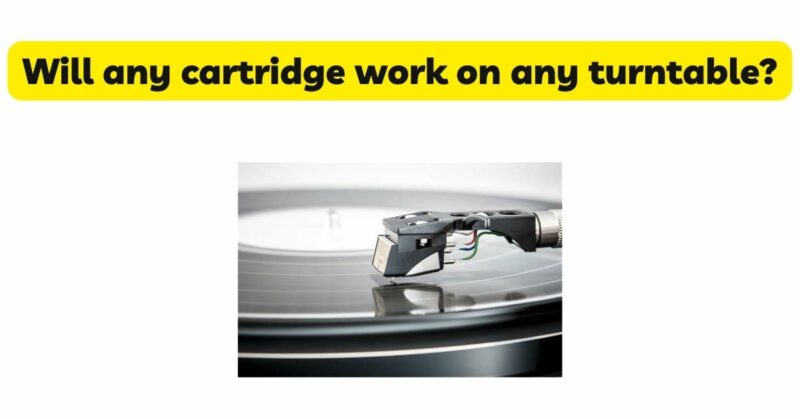When it comes to vinyl record players, one crucial component that directly affects the sound quality and overall performance is the cartridge. The cartridge houses the stylus (needle) responsible for reading the grooves on vinyl records and translating them into audible music. While turntables and cartridges are often sold separately, it is essential to understand that not all cartridges are compatible with every turntable. In this article, we will explore the factors that determine cartridge compatibility and explain why it is crucial to choose the right cartridge for your specific turntable.
- Cartridge Types and Mounting Styles: There are two primary types of cartridges: moving magnet (MM) and moving coil (MC). MM cartridges are more common and affordable, while MC cartridges tend to offer higher fidelity but come at a higher price point. Within each type, cartridges also differ in their mounting styles. The most common mounting styles are standard mount (also known as 1/2 inch mount) and P-mount (T4P). It is crucial to identify the type and mounting style of your turntable before selecting a cartridge, as different turntables are designed to accommodate specific cartridge types.
- Cartridge Weight and Compliance: Another important consideration for cartridge compatibility is the weight and compliance of the cartridge. Cartridge weight refers to the mass of the cartridge body, while compliance refers to the flexibility of the cartridge’s suspension system. Both of these factors are crucial for achieving optimal tracking and minimizing record wear. Turntables are designed with specific tonearm characteristics, including the ability to handle a certain range of cartridge weights and compliances. Using a cartridge that is too heavy or too light for the turntable’s specifications can result in poor tracking performance and potential damage to your vinyl records.
- Tonearm Wiring and Connection: The wiring and connection configuration of a turntable’s tonearm can also impact cartridge compatibility. Some turntables have detachable headshells, allowing for easy cartridge swapping, while others have integrated tonearms with fixed wiring. It is essential to check whether your turntable has a removable headshell or fixed wiring, as this will determine the type of cartridge that can be installed. Additionally, the tonearm’s wiring configuration (typically either standard mount or P-mount) must match the corresponding cartridge’s wiring for proper electrical connection.
- Turntable Specificities: Different turntable models may have additional specifications or features that affect cartridge compatibility. For example, some turntables have adjustable counterweights and anti-skate mechanisms, which help ensure proper tracking and prevent the stylus from skipping across the record surface. These features need to be taken into account when selecting a cartridge to ensure compatibility and optimal performance. It is advisable to consult the turntable’s user manual or contact the manufacturer for specific recommendations.
- Upgrading Cartridges and Compatibility: Suppose you are considering upgrading your turntable’s cartridge to enhance the audio quality or meet specific requirements. In that case, it is crucial to research and select a cartridge that is not only compatible with your turntable but also an improvement over the existing cartridge. Consider factors such as stylus shape, material, and overall construction quality to make an informed decision. Additionally, keep in mind that some high-end cartridges may require specialized phono preamps or additional equipment to operate optimally.
Conclusion: While turntables and cartridges are separate components, not all cartridges will work on any turntable. Compatibility between the two relies on several factors, including cartridge type, mounting style, weight, compliance, tonearm wiring, and turntable specifications. Choosing the right cartridge for your turntable is crucial for achieving optimal sound quality, preventing damage to records, and ensuring smooth tracking. It is advisable to consult the turntable’s user manual, reach out to the manufacturer, or seek advice from audio experts to ensure compatibility and make an informed decision when selecting a cartridge.


